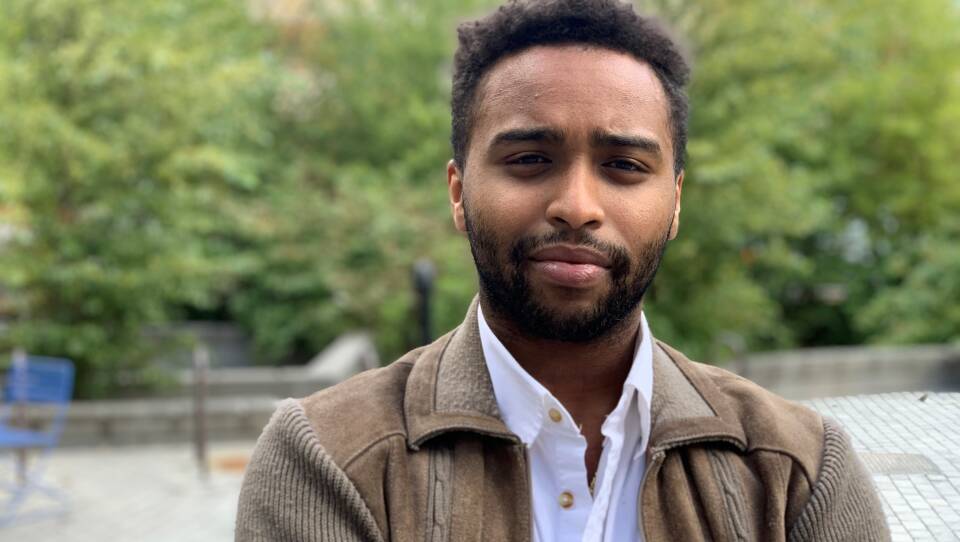Belmont High School graduate Ricky Alfred signed up for online classes at Bay State College during the pandemic, but he soon regretted it.
“No one was there to really guide me,” the 20-year-old recalled. “It was always one other person you have to go through or [another] person has that information.”
Alfred wishes he had not spent his father's GI benefits to pay for two semesters at the college, and he thinks he was overcharged thousands of dollars for classes he attended remotely. When he tried to transfer to another school, he said he was wrongly reenrolled and charged tuition.
Alfred is the latest student to come forward about problems with Bay State College, a for-profit college owned by a Chinese company operating campuses in downtown Boston and Taunton. Several students told GBH News they were misled about the school's academic programs and charged for courses that didn't exist or were canceled suddenly. Now the Massachusetts attorney general's office is reaching out to former students and faculty online to get information about the college's practices.
A spokesperson for Attorney General Maura Healey's office said staff is "working to get more information about the situation" and encouraging current and former Bay State students to share their concerns or complaints with the AG's office and the Massachusetts Department of Higher Education.
Bay State did not respond to repeated requests for a comment.
More Education
“This fits a very unfortunate pattern,” said Barmak Nassirian, vice president for higher education policy with Veterans Education Success, a nonpartisan policy and advocacy organization in Washington, D.C.
Nassirian said colleges — specifically for-profit institutions — have long oversold the quality and scope of what they offer by misrepresenting course offerings and inflating graduation and job placement rates. Those actions, he said, undermine public trust in the higher education industry.
Following the collapse of for-profit giants Corinthian Colleges and ITT Tech , Nassirian said the unwinding of schools like Bay State have also become highly recognizable.
“As the outcomes catch up with the reputation of the place, you begin to see the plummeting numbers, you begin to see complaints filed," he said. "And the consequence of it all is that the place begins that downward spiral of business trouble."
Ambow Education, a Chinese holding company based in the Cayman Islands, bought Bay State College in 2017. Last month, GBH reported that Bay State’s enrollment had plummeted — dropping from more than 1,200 students in 2010 to about 300 last spring. After that story was published, the chief financial officer of Ambow abruptly resigned .
In the summer, Bay State's accreditor placed the college on probation over financial and staffing concerns. Even so, the college is still not among the schools being monitored financially by the U.S. Education Department or the Securities and Exchange Commission, which would prevent it from receiving federal dollars.
"There's a lack of oversight," said veteran Dahn Shaulis, a former community college instructor who now writes a blog focused on the for-profit college industry and manages a private Facebook group for veterans who "who had their GI Bills stolen from them by fraud in higher education."
Shaulis said for-profit colleges fit a pattern of targeting veterans using government benefits to pay their tuition.
“Once there are businesses that know there is free money out there, they'll take advantage of it," he said.
Nassirian said government agencies that are supposed to keep the institutions accountable are "pretty ineffective and very weak."
“It’s really triage after the disaster," he said, noting the challenges ahead for the Massachachusetts attorney general's office if it pursues action against Bay State.
"It becomes really tough for a state agency to go after an entity that has the rubber stamp of federal departments and has legal access to millions of dollars of federal money," he said.
As for Ricky Alfred, the Bay State student who used his father's GI benefits to pay for his classes: he decided to transfer to another local college.
And he said leaving the college posed new problems. Bay State automatically re-enrolled him and said he's financially responsible for tuition payments.
"I emailed the dean,” he said, recalling his initial shock. “I tried to reach out to admissions — anyone — just to let them know: 'Hey, I never said I was going to attend, and you guys have this debt that came out of nowhere.'"
Alfred's now working with the U.S. Department of Veterans Affairs to claw back his family's GI benefits.








